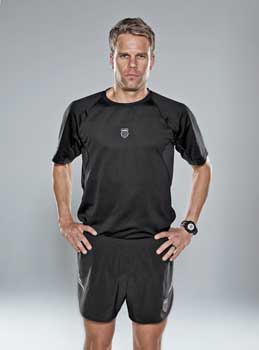At the 2009 Rock ’n’ Roll Arizona marathon in Phoenix, Josh Cox’s attempt to break the world record in the 50K was thwarted by restroom stops. “My legs felt fine, but I was having a hard time with fluids,” remembers the 36-year-old Mammoth Lakes, California, runner. His mistake: by drinking too much in an effort to stay hydrated, he became bloated, and by race’s end he had vomited six times. The sick bouts put Cox minutes off his planned pace, though he still bested the U.S. 50K mark by more than four minutes. “I thought, If I can set an American record on a bad day,” says Cox, “I’m going to get my nutrition right and come back for the world record.”
Setbacks like Cox’s aren’t uncommon. In a recent study in the International Journal of Sports Physiology and Performance, nearly a quarter of ultramarathoners in two major U.S. events reported digestive issues. And 23 percent said they dropped out because of nausea or vomiting, which underscores a crucial lesson Cox has learned. “Training is the easy part,” he says. “Nutrition is the secret weapon.”
It’s easy to fixate on working out harder, but changing your diet can unlock a whole new level of performance. And good nutrition begins long before the starting gun. A 2009 study by researchers at Southern Connecticut State University showed that cyclists who modified their diets to lose weight improved their performance almost 10 percent, the same amount experienced by cyclists who added intense interval training to their regimen.
Athletes often miss out on these benefits through simple inattention. “People go to great lengths to pick a coach and plan their training,” says sports dietitian Suzanne Girard Eberle. “But food and nutrition are an afterthought.” Have you planned tomorrow’s workout but not what’s for breakfast? Do you know how many grams of carbs and proteins you’ll need in the first hour after exercise? If not, you may be robbing yourself of many of the benefits of training. “Workouts are like classes, and nutrition is like studying,” says dietitian Jenna A. Bell, coauthor of the 2009 book Energy to Burn. “You can attend all of your classes, but if you don’t take time to study for the exam, it’s unlikely you’ll do well.” And as in school, the more you learn about what to eat and when to eat it, the better you’ll do.
In the months following the 2009 marathon, Cox fine-tuned his diet and, on race days, took in more nutrients and less liquid by using energy gels diluted in water. Last January, during another race in Phoenix, he shaved a whopping 3 minutes and 32 seconds off his previous best and missed the world record by just seven seconds. “It came down to not getting enough calories in the last part of the race,” says Cox. During the final 10K, he neglected to polish off his drink bottles. “With a bit more honing, next time I’ll be a lot faster,” he says.
The same goes for the rest of us. There’s no magic recipe for perfect performance, but a solid understanding of how best to fill your tank can make for huge gains.


